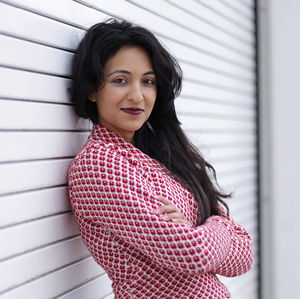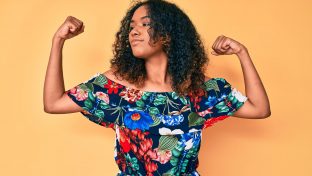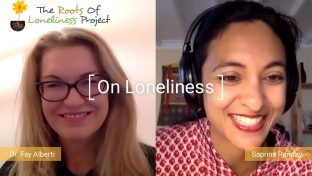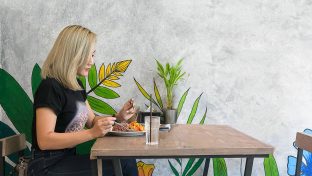Loneliness And The Unspoken Expectations Of Black Women
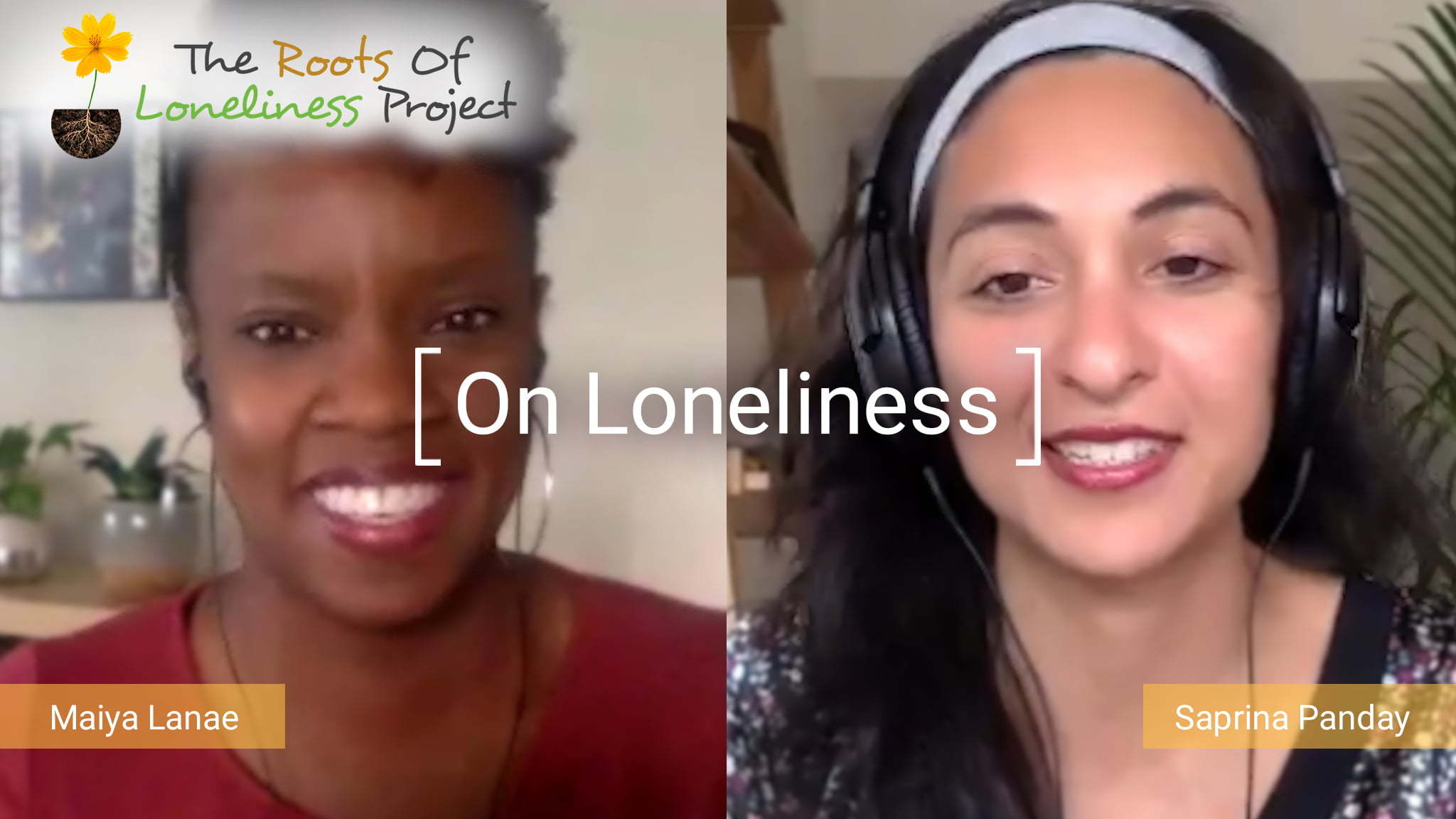
I’m not supposed to be lonely.
I have everything I ever wanted — very close friends and family, many career options — and to top it off, I’ve found the love of my life. Whenever I feel down I know there are people I can reach out to.
Yet, like many of you, I still feel…lonely.
And perhaps the reality of modern life is that, in some form or other, we ALL do.
In 2017, former U.S. Surgeon General Vivek Murthy called loneliness an epidemic.
The following year, the UK appointed its first Minister for Loneliness.
As harmful to our health as smoking 15 cigarettes a day, loneliness affects millions of people across socio-economic groups and cultures, from millennials to the elderly.
So what does this tell us about the world we inhabit — about ourselves and each other? And what can, or should, we do about it?
All of these questions are explored in our new series: “On Loneliness: A Video Series About Coping With Feeling Lonely” created by The Roots Of Loneliness Project.
Community Health And Connection Are Important — For Everyone
Maiya Intro: People think, “Oh, black women are okay. Oh, they’re fine. They don’t need support. They don’t need as much help. They don’t need to be vulnerable.” It doesn’t allow us to really have those moments of weakness and vulnerability because we are not allowed to.
Saprina Intro: Maiya Lanae is an entrepreneur, educator, and artist. As a university lecturer, she works at the intersection of public and holistic health. She is now launching her health and wellness business for women of color called, “Hey Girl Health.” Maiya is also a DJ.
Saprina: Can you please talk a bit more about what you do in terms of helping people connect to each other?
Maiya: Much of the work that I do is around health and that’s a broad definition of health. So it’s not only your personal health — like eating kale and doing SoulCycle — but it’s also community health.
How can communities thrive and communities be healthy?
I am a university lecturer and in my classes, I teach my students about the importance of when you do have those feelings of loneliness or isolation, how can you connect, who can you call, where can you go?
Can you go to a dance class? Can you do art? Are there people that you can connect to online? It’s very, very important to have folks connect.
And also in the business that I’m starting called, “Hey Girl Health,” I’m working with women of color and connection is definitely something that I’m going to be teaching them how to do and supporting them with doing because, like I said, it’s not just about what you eat but it’s also about who’s around you and the people that can uplift you as well and support you in uplifting yourself.
Saprina: Are there specific challenges that people from different places bring?
Because somebody who’s from a South Asian background, for example, I know that I can’t really talk about loneliness. I can’t really talk about depression because these are things that are not part of the culture.
So are there some of those challenges that you have to face when you’re trying to speak to many people from these communities?
Maiya: Thank you for bringing that up.
So that’s a very timely question for me because we just had a class on mental health and what the connection is between mental health and culture and identity, and how a lot of times in our cultures — especially in communities of color — especially in immigrant communities as well, it’s just not done.
You don’t talk about mental health, you don’t talk about your problems, you don’t talk about loneliness, you just “do,” because a lot of us here are just trying to survive or just trying to feed our families.
And so there’s no time to talk about any kind of mental health challenges or any kind of loneliness that’s happening.
So for me, in all of the work that I do, I always bring that cultural piece in there because the way that we define what is healthy, what is mental health and what is, quite frankly, normal is not necessarily inclusive of cultural differences.
I think it’s very important to address those cultural differences and not to make those cultures a monolith.
So, for example, when you say “people of color,” that’s putting a whole lot of people in one pot.
Like you were talking about, if you’re South Asian versus if you’re South American, you have two completely different cultural understandings of what it means to be healthy.
So for me, it’s very important to ask what those differences are and what is it that makes people feel included, how do people define culture?
And really, I’m using something called cultural humility where you’re really being humble and you’re asking them, “Hey, you know, what is your experience?”, instead of trying to tell them what their experience is, asking them what their experience is, and then going from there.
Loneliness Is Not Always Bad — It’s Sometimes Necessary
Saprina: So do you think we should be trying to get rid of loneliness?
Maiya: I don’t think loneliness is necessarily a bad thing.
Sometimes when you feel lonely it reminds you of the things that you need in life or it allows you to just be with yourself.
I think when loneliness sort of can get toxic, is when you feel isolated and when you feel like you don’t have anybody around, I think that’s when it kind of can get unhealthy.
But I think loneliness is necessary because it provides a contrast.
I think when there’s too much loneliness and there’s too many of us that are feeling lonely — especially when we can develop resources or can be in communities to not feel that way — I think it’s important to kind of see the spectrum of loneliness, if that makes sense.
There’s talk about a “loneliness epidemic” now, and I do think that with us being on social media, with us being on our phones all the time, they call it “being alone together.”
And so even though you have a million followers on Facebook, or Instagram, you still feel lonely because you don’t have anybody in your actual space physically to be with.
So, in that regard, I do think loneliness is an issue but I don’t think being alone is an issue if that’s something that you need or where you feel comfortable as well.
Loneliness Is Defined Differently Across Cultures
Saprina: What is something that you think we should really be talking about when it comes to loneliness for mental health?
Is there something that you feel is not being covered or not being seen? Is there a perception or a view of a certain community that you feel is not being represented?
Maiya: I think it’s very important to recognize that across different cultures, there’s a different definition of what loneliness is.
So for one culture, loneliness may be not having anybody around, and for another, it may be not having a big family.
It’s defined differently.
I also think that we need to expand our definition of what loneliness is.
In healthcare, we see it time and time again that a lot of research has white males at the base and when that is the norm, everything else that’s different from that deviates from what is defined as the norm.
But, as a black female, I definitely have my own way that I walk through the world and loneliness is defined very differently at least from the people that I know and the people that I work with.
So, as a woman of color, you have to be tough in a certain way.
You have to sort of have these survival mechanisms and safety mechanisms in place, almost from birth, because you know that you have to sort of be ready to navigate a world that was not really created for you.
So to define loneliness as a feeling of isolation, a feeling of not having anybody around, it just looks different for different people.
And definitely as for women of color, we find ways to integrate because we have to be really creative to navigate this world, if that makes sense.
Saprina: Of course. It makes a lot of sense. Thank you so much for sharing that, it’s so important.
I think that we always should be aware of who created the system and for whom was it created. I’d love to hear more about that.
Black Women Aren’t “Allowed” To Be Vulnerable (Or Lonely)
Maiya: So I think as women of color, like I said, we have a certain set of survival skills and as black women especially, we’re expected to be tough.
We are sort of uplifted as this beacon of strength and resilience, and that kind of puts us in a box where we’re expected to be strong, we’re expected to be resilient, we’re expected to just be able to endure anything.
I think we’ve really been able to succeed on that front. We’ve been able to just roll with the punches.
But with that, I think it lets a lot of people off the hook, honestly.
I think that because people think, “Oh, black women are okay. Oh, they’re fine. They don’t need support. They don’t need as much help. They don’t need to be vulnerable,” it doesn’t allow us to be vulnerable. It doesn’t allow us to have weak moments.
And you see a lot of black women putting up the front that, “Hey, I’m strong. Hey, I got this. You know, I got this, I got me, I got you. I got us.” But it doesn’t allow us to really have those moments of weakness and vulnerability because we are not allowed to.
As a society, and I’m going big here, but as a society, I think that there’s sort of an unspoken expectation that black women don’t need to be taken care of.
That is really at the root of the work that I’m doing.
That, “No, actually you do need to be taken care of. Actually, not only do you need to be taken care of but you have permission to take care of yourself. And that’s okay. You don’t have to be strong all the time.”
There’s actually this show called “Being Mary Jane” and it’s about a black woman who’s a journalist in Atlanta and she’s just tough, tough, tough, tough, tough.
No matter what she’s going through, no matter what’s happening in her family or in her work, she’s always pushing through and being tough.
But then she has these moments of breakdown, and I see her as the perfect sort of archetype of the strong black woman that you have to be a rock all the time and you have to be able to endure anything, and that’s what makes part of your value.
Because, you know, in America we have our value system of pull yourself up by your bootstraps, you got to be able to make it.
I keep hearing this statistic that black women are one of the most educated groups in the United States — 60% percent of the population, that’s saying something.
[Editor’s note: According to the National Center for Education Statistics, out of all black people receiving degrees, black women are earning 67% of the associate’s degrees and 64% of the bachelor’s degrees.]
We do it no matter what.
We’re going to get our education, even though our men are in jail, and even though we have to take care of our families and yada, yada, yada, we’re still going to do it.
It’s great, and so that story is great, it’s such a powerful story.
And yet we have some of the worst health outcomes.
We see — whether it’s low birth rate, whether it’s heart disease — that strength and endurance also comes at a cost.
And so I think it’s really important that we talk about that as well.
It’s not only black women that experience this, but for me being a black woman and working a lot with black women, it’s something that I definitely want to elevate and highlight as an issue to be addressed.
Women Of Color Need To Connect, To Recognize Vulnerabilities And Strengths
Saprina: Definitely. And I just wanted to know and I know that this is a big systemic issue, but do you think that on an individual level, there’s anything that every individual can do to help each other in this situation and especially help black women?
Maiya: It’s a cultural thing.
I think as a society, we need to recognize our vulnerabilities as much as we do our strengths.
You know, the work of Brené Brown has been really powerful in really addressing and highlighting the power of vulnerability and saying, “Hey, sometimes, I can’t.” “Hey, I’m unable,” or, “I need a moment. I need some time. I need to take care of myself.”
Because what we do is we run ourselves into the ground and then we take care of ourselves because something’s happened physically with us or something’s compromised our health.
So I think, just as a culture, just in American culture, working hard and working, you know, a 15-hour day and having two, three jobs, is such a core part of our value system and things that we’ve valued.
So as black women, we’re just a part of that system. So I think just being able to dialogue and communicate about our vulnerabilities is a great start.
I think just dialoguing among each other because we all are very strong, and we also should be allowed to have vulnerabilities as well.
And let’s not discount the systems of oppression that exist where women of color and black women are definitely affected with that as well, it’s not just something that’s happening in our head or on our own.
This system was not designed for us. We are subject to the circumstances that we’ve been given, and we’ve been able to do a lot with those circumstances and we’ve been able to thrive, but not enough.
One is a huge systemic change that needs to happen, and also us being able to connect with one another and have these conversations and to be vulnerable and to laugh and to have fun and be creative and dance and all those things as well.
And to really allow ourselves and each other to explore our full selves and be our full selves and show up with all of who we are and not just specific parts.
3 Ways To Connect With Others When Feeling Loneliness
Saprina: Can you share some tips on how we can find resources [to help with loneliness]?
Maiya: Definitely what I’m going to be sharing with my clients on “Hey Girl Health” is:
- One, just identify what makes you feel good. Because for some of us, it’s being with a whole lot of people, for some of us, you can just go to a dance class where there are people, you don’t necessarily have to befriend anybody. So, first of all, identifying what it means for you to be in a community and what it means for you not to feel lonely or to feel like you’re included in something.
- Secondly, finding your tribe. For some of us, that can be with activities. It could be meetup groups, it could be just hanging out with friends that you know, maybe it’s coworkers, but, who do you feel comfortable being around if you do feel those feelings of loneliness.
- [Third] is just identifying places where you can connect. Connect to nature, connect to yourself — so if you like to hike, if you like to swim. I always like to encourage folks to get outside as much as you can because it’s not always just [about] people. Sometimes you can just be at a river and you can feel totally integrated and that’s fine as well.
So those would be my three top tips.
Saprina: Maiya, thank you so much for this. This was such a pleasure talking to you and learning about all of these amazing things you’ve got to say.
Maiya: Thank you so much for having me, Saprina. This was a wonderful conversation and I think it’s something that is incredibly important for us to talk about.
Editor’s Note: This article is a transcript from “On Loneliness: A Video Series About Coping With Feeling Lonely.” The interview has been edited for length and clarity.
This video is part of our ongoing series The Roots Of Loneliness Project, the first-of-its-kind resource that comprehensively explores the phenomenon of loneliness and over 100 types that we might experience over the course of our lives.
Find Help Now
If you’re struggling with loneliness as a black woman, we’ve put together resources to meet you wherever you are — whether you want someone to talk to right now, or are looking for longer-term ways to help ease your loneliness.
- Suicide Prevention Lifeline: 1-800-273-TALK (8255); Deaf or hard of hearing dial 711 before the number or connect via online chat
- Resources & Emotional Support For Loneliness
- Volunteer & Pet Adoption Opportunities

